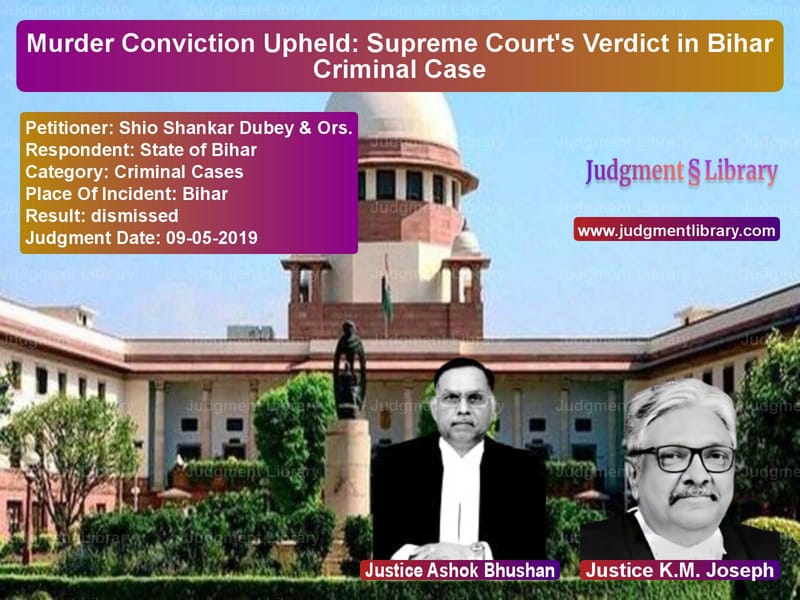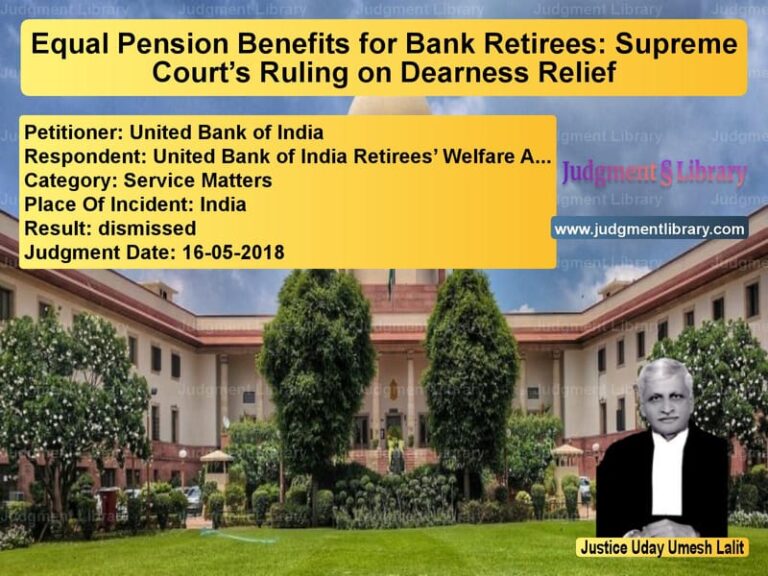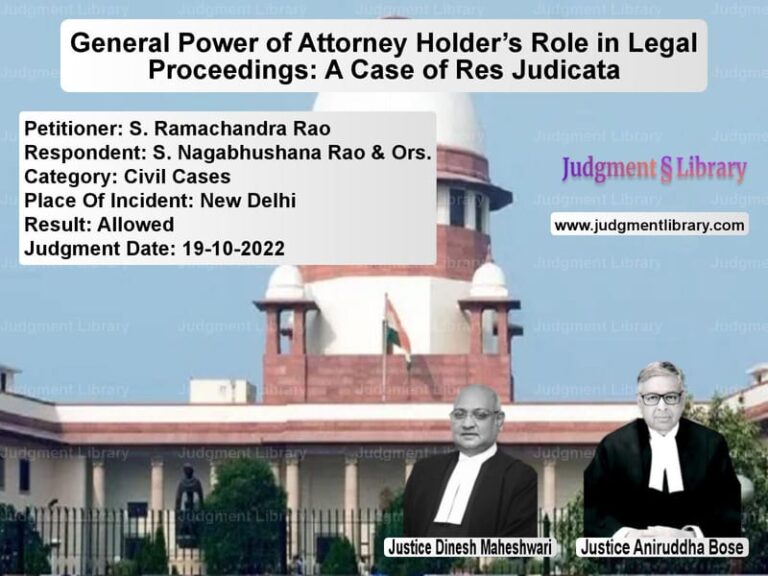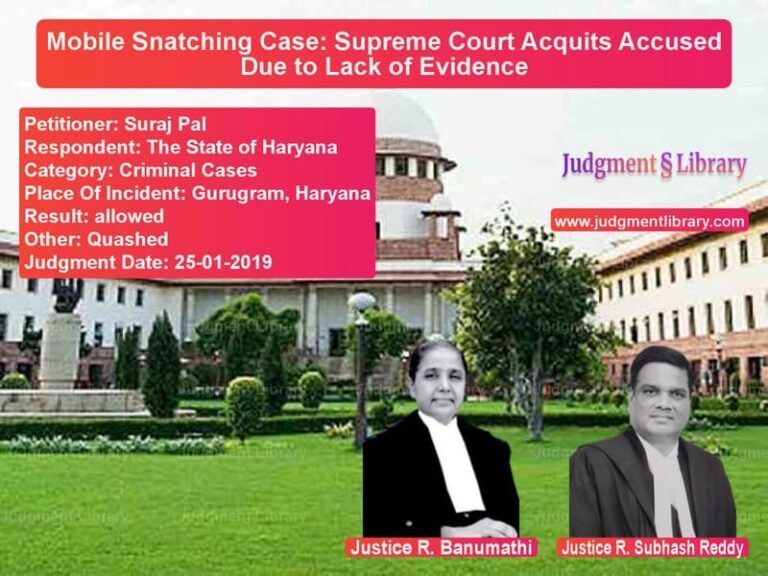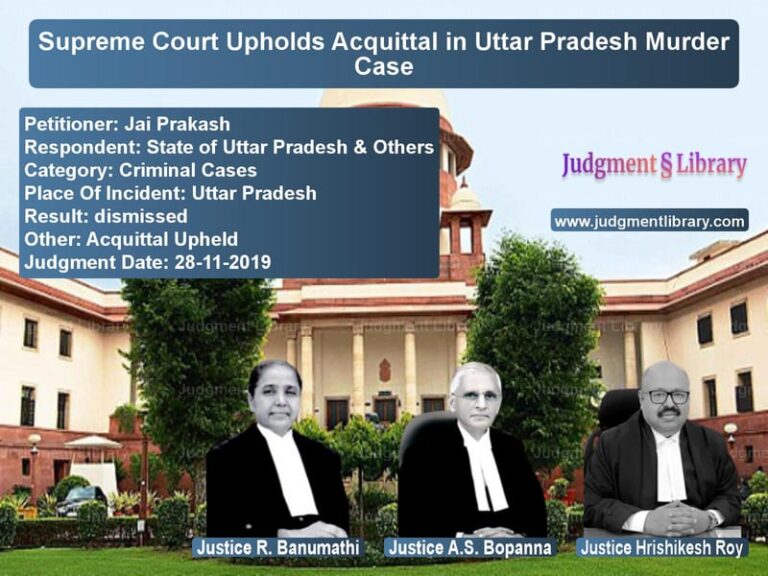Murder Conviction Upheld: Supreme Court’s Verdict in Bihar Criminal Case
The case of Shio Shankar Dubey & Ors. vs. State of Bihar revolves around a brutal murder that took place in Sasaram, Bihar, in 1980. The case involved multiple accused who were charged with offenses under Sections 302, 147, 148, 149 of the Indian Penal Code (IPC), along with the Arms Act. The trial court found the accused guilty, and the High Court upheld the conviction. The Supreme Court was approached for final adjudication.
The Supreme Court examined the evidence presented by the prosecution, including eyewitness testimonies, forensic reports, and motive for the crime. The case underscores the importance of credible witness testimony and the role of timely police action in criminal trials.
Background of the Case
The incident occurred on 16th May 1980 when the victim, Raj Keshwar Singh, was returning home with his brother, Raj Ballam Rai (the informant), after finishing work at the Sasaram Court. The victim was traveling on a rickshaw while the informant was on a bicycle.
As they reached Kargahar More, they were ambushed by the accused. The assailants, armed with lohbanda (a sharp-edged weapon), rifles, and lathis, pulled Raj Keshwar Singh from the rickshaw and attacked him. Shio Shankar Dubey, one of the main accused, reportedly ordered the others to “kill in a hurry.” The victim was brutally assaulted and succumbed to his injuries on the spot.
Legal Issues Considered
- Whether the eyewitness testimonies were reliable.
- Whether the forensic evidence supported the prosecution’s case.
- Whether the motive for the murder was established.
- Whether the accused were falsely implicated.
- Whether the trial court and High Court erred in convicting the accused.
Arguments by the Petitioner (Shio Shankar Dubey & Others)
- The main eyewitnesses were relatives of the deceased, making them interested witnesses whose testimonies should not be fully relied upon.
- There were inconsistencies in the medical evidence and inquest report, as the inquest report mentioned a bullet injury, but no such injury was found in the postmortem report.
- One of the witnesses, PW5, did not name Ram Pravesh Dubey among those fleeing the scene, raising doubts about his involvement.
- There was no clear motive established for the accused to commit the crime.
Arguments by the Respondent (State of Bihar)
- The prosecution’s key witnesses, PW11 and PW13, were present at the crime scene and provided a clear account of the attack.
- The medical evidence supported the injuries sustained by the victim.
- The inquest report’s mention of a bullet injury was a misjudgment by the investigating officer and did not impact the overall findings.
- The accused had a motive—political rivalry and previous disputes with the victim.
Supreme Court’s Observations
The Supreme Court upheld the findings of the lower courts, stating:
“The mere fact that eyewitnesses were related to the deceased does not render their testimonies unreliable. If their statements are credible and consistent, they can be relied upon.”
The Court further noted:
“The inquest report is not a substantive piece of evidence. The minor discrepancy regarding a bullet injury does not affect the credibility of the prosecution’s case.”
Key Findings of the Supreme Court
- The eyewitness testimonies were consistent and corroborated by forensic evidence.
- The motive for the crime was established based on previous enmity and political rivalry.
- The inquest report’s error regarding the bullet injury was not significant enough to overturn the conviction.
- There was no reason for the police to falsely implicate the accused.
Final Verdict
The Supreme Court dismissed the appeal and upheld the conviction of the accused. The trial court’s decision to impose a sentence under Sections 302/149 and 147 IPC was affirmed, ensuring that the perpetrators of the crime faced justice.
Implications of the Judgment
This ruling reinforces the importance of eyewitness testimonies in criminal cases and clarifies that minor discrepancies in procedural documents do not invalidate an otherwise strong prosecution case. It also highlights the significance of motive in criminal trials, particularly in cases involving political rivalries.
The judgment serves as a precedent for handling cases where defense arguments center around minor inconsistencies in evidence to seek acquittal.
Petitioner Name: Shio Shankar Dubey & Ors..Respondent Name: State of Bihar.Judgment By: Justice Ashok Bhushan, Justice K.M. Joseph.Place Of Incident: Bihar.Judgment Date: 09-05-2019.
Don’t miss out on the full details! Download the complete judgment in PDF format below and gain valuable insights instantly!
Download Judgment: Shio Shankar Dubey & vs State of Bihar Supreme Court of India Judgment Dated 09-05-2019.pdf
Direct Downlaod Judgment: Direct downlaod this Judgment
See all petitions in Murder Cases
See all petitions in Attempt to Murder Cases
See all petitions in Judgment by Ashok Bhushan
See all petitions in Judgment by K.M. Joseph
See all petitions in dismissed
See all petitions in supreme court of India judgments May 2019
See all petitions in 2019 judgments
See all posts in Criminal Cases Category
See all allowed petitions in Criminal Cases Category
See all Dismissed petitions in Criminal Cases Category
See all partially allowed petitions in Criminal Cases Category

